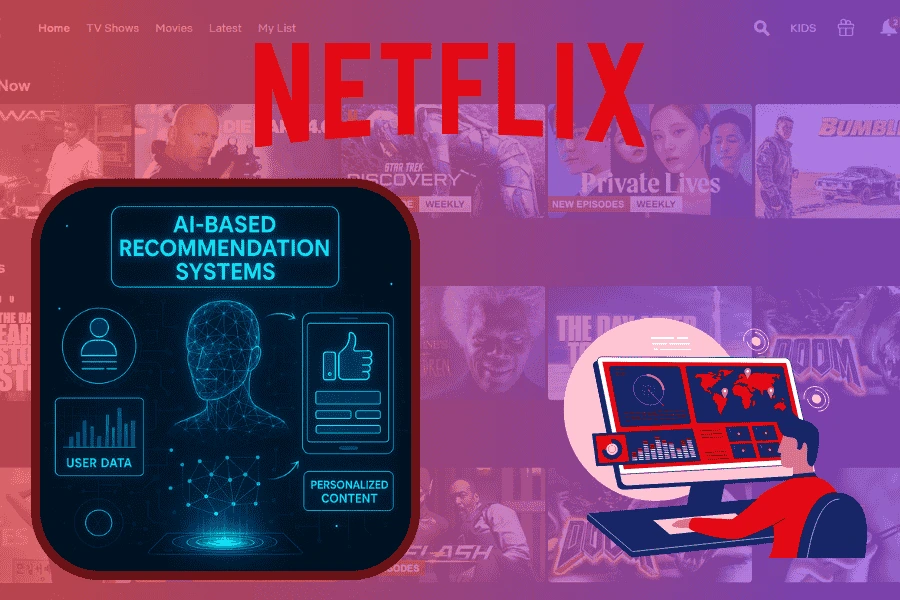Implementing AI-Based Recommendation Systems in Python
In the age of personalization, recommendation systems have become essential tools for businesses across industries—powering suggestions on platforms like Netflix, Amazon, and Spotify. These systems use AI to deliver tailored experiences, improve user engagement, and drive conversions. Thanks to its simplicity, rich ecosystem, and powerful libraries, Python is the leading language for implementing AI-based recommendation systems.

What is a Recommendation System?
A recommendation system is an algorithmic solution that filters and predicts user preferences or behaviors. Its goal is to suggest items (like products, content, or services) that are most relevant to a user, based on past data or similar user profiles.
- Content-Based Filtering: Content-based filtering is a recommendation technique that focuses on the attributes of items and a user's past preferences to make predictions. Instead of relying on other users’ data, it uses information about the item (such as genre, category, bran.
- Collaborative Filtering: Collaborative filtering is a popular recommendation technique that makes predictions about a user’s interests by collecting preferences from many users. Unlike content-based filtering, it doesn’t rely on item attributes; instead, it assumes that if two users had similar interests in the past, they will likely agree on other items as well.
- Hybrid Systems Hybrid recommendation systems combine multiple recommendation techniques typically content-based and collaborative filtering to leverage the strengths of each while minimizing their weaknesses. This approach often results in more accurate, robust, and personalized recommendations than using a single method alone.
Why Use Python for Recommendation Systems?
Python offers an ideal environment for building recommendation engines due to several key advantages:
- Rich Libraries: Libraries like pandas, NumPy, scikit-learn, Surprise, and TensorFlow provide all the tools needed for data manipulation, model building, and evaluation.
- Ease of Use: Python’s readable syntax and active community make it accessible and fast to develop prototypes.
- FlexibilityPython supports various models and algorithms—from simple statistical methods to complex neural networks.
- Scalability:Integration with cloud services and big data platforms allows Python-based systems to scale for real-time applications.
Real-World Use Cases
- E-commerce Platforms like Amazon use AI-based recommenders to suggest products based on browsing history, cart activity, and purchase data.
- Streaming Services : Netflix and Spotify use collaborative filtering and deep learning to personalize content feeds.
- Online EducationPlatforms like Coursera or Udemy suggest courses based on past enrollments and learner profiles.
- News and MediaRecommender systems help personalize articles, videos, or ads based on user interests.
Advanced Recommendation Techniques
Once you’ve mastered basic filtering methods, you can explore more advanced techniques:
- Matrix Factorization (e.g., Singular Value Decomposition).
- Deep Learning: Neural collaborative filtering, attention mechanisms.
- Reinforcement Learning: For dynamic, real-time recommendations.
- Content Embeddings: Using NLP to extract features from item descriptions.
Conclusion
Python’s simplicity and extensive toolkit make it the go-to language for building powerful AI-based recommendation systems. Whether you're personalizing an e-commerce site, creating a content platform, or building a mobile app, Python provides the foundation to develop accurate, scalable, and engaging recommendations. With the growing importance of personalization in every digital experience, mastering recommendation systems in Python opens the door to endless innovation and competitive advantage.
Active Events
Laying the Groundwork: Python Programming and Data Analytics Fundamentals
Date: Aug 06, 2025 | 7:00 PM(IST)
7:00 PM(IST) - 8:00 PM(IST)
2811 people have registered
Transition from Non-Data Science to Data Science Roles
Date: Aug 07, 2025 | 7:00 PM (IST)
7:00 PM (IST) - 8:10 PM (IST)
2753 people have registered
3 Must Have Projects On your CV to Get into Data Analysis
Date: Aug 05, 2025 | 7:00 PM(IST)
7:00 PM(IST) - 8:10 PM(IST)
2753 people have registered
Bootcamps
Data Analytics Bootcamp
- Duration:8 weeks
- Start Date:October 5, 2024
Data Science Bootcamp
- Duration:8 weeks
- Start Date:October 5, 2024
